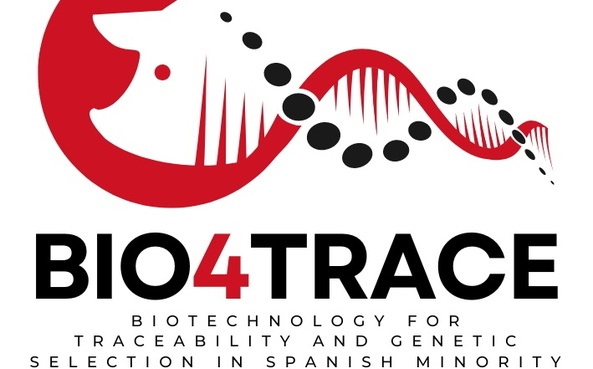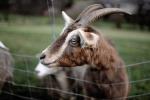
BIO4TRACE Operational Group: Biotechnology for traceability and genetic selection in Spanish minority pig breeds
- Type Operational group
- Status In progress
- Execution 2024 -2026
- Assigned Budget 599.262,00 €
- Scope Supraautonómico
- Autonomous community Canarias; Galicia; Murcia, Región de
- Main source of financing CAP 2023-2027
- Project website GO BIO4TRACE
The Operational Group (OG) focuses on promoting and revitalizing endangered minority Spanish pig breeds by implementing a digital system using blockchain technology that guarantees extreme traceability. This ensures the origin and quality of products from the animals' genetics to the consumer, driving the development of these breeds and benefiting farmers by increasing their competitiveness.
The first specific objective is to identify specific molecular markers for each of the minority breeds, thus allowing the differentiation of their products in the market and guaranteeing traceability from start to finish. The identification of these molecular markers is essential to accurately certify the origin of the products.
Objective 2 aims to determine the Quantitative Trait Loci (QTLs) related to meat quality, especially the fatty acid profile and the amount of infiltrated intramuscular fat (IMF). In addition, it aims to identify QTLs related to the ability to adapt to the environment, considering the particular conditions of each breed, such as forest environments or extremely hot climates. This genomic information is essential to improve the breeding and adaptation of minority pig breeds, which will result in higher quality meat production and more sustainable livestock farming.
The third specific objective involves the establishment of breed-specific breeding and traceability programmes, with the aim of facilitating the exchange of animals between different producers and, in this way, achieving significant genetic improvements. These breeding and traceability programmes are necessary to ensure the long-term survival of the breeds, promoting their adaptation and genetic improvement.
Objective 4 aims to promote a common identity reference for minority native breeds, focusing on the extreme traceability of quality products. This measure aims to consolidate the unity of the breeds and increase their recognition and appreciation. Therefore, by creating a solid and differentiating identity for these breeds, their preservation and positioning in the market as high-quality and environmentally sustainable products is strengthened.
The most digital part is in specific objective 6, with the creation of a cloud data management platform enriched with artificial intelligence representing a technological leap in the certification and traceability of all stages of the value chain. This will promote smarter and more efficient decision-making, improving data quality, correlation and reliability for the end consumer. It is anticipated that this technological solution will open up new opportunities for optimization, cost savings and operational improvements for all organizations involved, driving innovation in data management and traceability. The most digital part will consist of the implementation of advanced technologies such as artificial intelligence and blockchain that will ensure efficient and reliable data management, which is essential to maintain product traceability and authenticity. Furthermore, this federated platform has the potential to revolutionize data management and open up new avenues for optimization and efficiency throughout the value chain.
This result implies achieving an accurate and meaningful correlation between genetic information and physical characteristics of minority indigenous breeds on the AI platform, and as a result, a deeper understanding of how genetic profiles relate to the physical traits and performance of these breeds will be obtained.
This will enable more precise selection of specimens for breeding, leading to more effective improvement of the quality of offspring and preservation of the distinctive characteristics of these breeds.
This data correlation is essential to strengthen the preservation and sustainable development of indigenous breeds.
By understanding how genetic profiles translate into physical and performance characteristics, producers will be able to make more informed decisions when selecting animals for breeding, which will contribute to the continuous improvement of these breeds and their adaptation to changing conditions. Finally, we chose to create a solid identity reference for these breeds, which we believe is essential for their recognition and appreciation in the market.
Determination of microsatellite, SNP, and whole-genome profiles in minority breeds. Determination of fatty acid and IMF profiles in meat from minority breeds; and the relationship between objectively measurable stress and adaptation to the forest environment and exposure to extreme temperatures. Establishment of a statistically significant relationship between any of the markers studied and the morphological or production characteristics determined (stress, fatty acids, IMF). Establishment of marker-assisted selection criteria for each breed and traceability using specific tests for the markers found.
Systematic collection of phenotypic data from Porco Celta animals to establish meaningful and valuable relationships with genomic information. Development of a pioneering minority breed data platform for cloud-based data integration and management, powered by blockchain technology and enriched with an artificial intelligence layer. AI-powered platform: deeper understanding of how genetic profiles relate to the physical traits and performance of these breeds.
- R1, R2, R3, and R4 - Microsatellite, SNP, and whole-genome profiling in minority breeds involves the generation of specific genetic data that can be measured and analyzed quantitatively. These data will be essential for advancing scientific and technological knowledge in the field of animal genetics.
- R5 - Database file with individualized phenotypic information with at least 100 entries originating from 5 or more farms, which will be uploaded to the platform for integration.
- R6 and R7 - Development of a platform that will enable the efficient collection, storage, and management of phenotypic and genomic data on minority native breeds. Artificial intelligence will be used to analyze this data in an advanced manner, while blockchain technology will ensure traceability and information security. The final integration of both technologies will enable the correlation of phenotypic and genomic data across multiple minority native breeds, facilitating breed management and conservation and contributing to the long-term preservation and sustainable development of these breeds. Reducing data processing and search times could translate into a 30% improvement and minimizing errors in genomic and traceability data management. Comprehensive traceability certification would increase customer confidence by 25% and open up opportunities for new markets.
- R8 - Establishing a solid identity reference for minority breeds that represents a significant advance in the promotion and conservation of these breeds in the market, which in turn can translate into economic and cultural benefits.
In Spain there are 6 recognized breeds in danger of extinction that, thanks to the joint work with the MAPA and the Councils, have overcome the critical period caused by the scarcity of specimens (inbreeding, loss of genetic heritage...) and although they are in different stages, as a common element they are at a clear disadvantage with commercial white breeds in terms of development (still very few specimens), professionalization, genetic selection and level of commercialization and they do not yet have genetic tools such as molecular biology, digital solutions and they do not have a market share.
Furthermore, the small size of farms hinders competitiveness and generational renewal, the fragmented nature of production, which prevents the development of common genetic selection programs and shared learning within and between breeds, and the limited penetration of the consumer market are also noteworthy. It is worth highlighting the role of breed associations, which clearly play a role in defending and protecting the breed but currently have limited resources to compete with the companies operating in the sector.
From the perspective of livestock farmers, they face sharply rising production costs. Climate change has altered the habitats where their animals are raised, and there is great uncertainty about how breeds will respond to their productions, ensuring they are profitable and adapted to climate stress. For livestock farmers, breeds would take a step backward, becoming a mere genetic reserve in the hands of public administrations. In fact, rural abandonment and uncertainty about the future are currently leading to fewer and fewer producers who can guarantee their survival in the medium term. This combination of weaknesses and threats creates a vicious cycle: there are fewer and fewer farmers, and with fewer farmers, the breed is declining. With this, genetic selection becomes useless, making it impossible to increase profitability and thus starting the cycle all over again.
HIGH AND ULTRA DENSITY GENOTYPING AND PHENOTYPING FOR EXTREME TRACEABILITY FROM FARM TO TABLE, GUARANTEEING THE ADDED VALUE OF MINORITY NATIVE PIG BREEDS IN DANGER OF EXTINCTION, COMMITTING TO SUSTAINABLE LIVESTOCK FARMING THROUGH ARTIFICIAL INTELLIGENCE AND DIGITAL CERTIFICATION BY BLOCKCHAIN.
- Coordinator/entity name: CELTIC PIG BREEDERS ASSOCIATION
- Postal address: AVDA. FÁBRICA DA LUZ, S/N-PALACIO DE FAIRS AND CONGRESS OF LUGO
- Coordinator/entity email: asoporcel@asoporcel.es
- Telephone: 982 226 252
- ASOCIACIÓN DE CRIADORES DE LA RAZA PORCINA CELTA
- ASOCIACIÓN DE CRIADORES DE LA RAZA PORCINA CELTA
- FUNDACIÓN TERREO
- PYRAMIS S.L.
- ASOC DE CRIADORES DE COCHINO NEGRO DE CANARIAS
- CACHAMUR (CRIADORES ASOCIADOS DE CHATO MURCIANO)
- EDICIONES Y PUBLICACIONES ALIMENTARIAS, S.A





